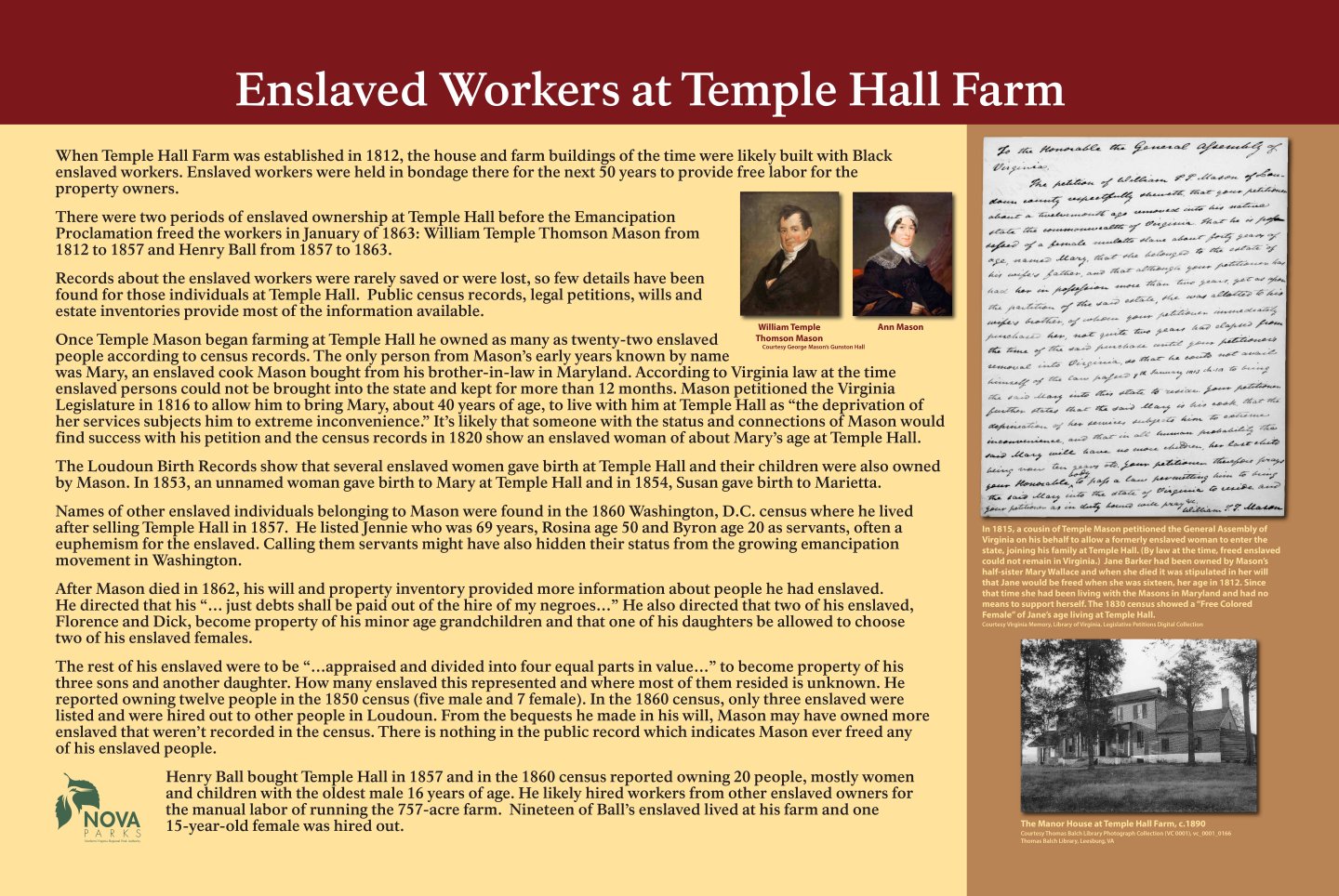Temple Hall Farm Regional Park
Park History Interpretive Series: Enslaved Workers at Temple Hall Farm

When Temple Hall Farm was established in 1812, the house and farm buildings of the time were likely built with Black enslaved workers. Enslaved workers were held in bondage there for the next 50 years to provide free labor for the property owners.
There were two periods of enslaved ownership at Temple Hall before the Emancipation Proclamation freed the workers in January of 1863: William Temple Thomson Mason from 1812 to 1857 and Henry Ball from 1857 to 1863.
Records about the enslaved workers were rarely saved or were lost, so few details have been found for those individuals at Temple Hall. Public census records, legal petitions, wills and estate inventories provide most of the information available.
Once Temple Mason began farming at Temple Hall he owned as many as twenty-two enslaved people according to census records. The only person from Mason’s early years known by name was Mary, an enslaved cook Mason bought from his brother-in-law in Maryland. According to Virginia law at the time enslaved persons could not be brought into the state and kept for more than 12 months. Mason petitioned the Virginia Legislature in 1816 to allow him to bring Mary, about 40 years of age, to live with him at Temple Hall as “the deprivation of her services subjects him to extreme inconvenience.” It’s likely that someone with the status and connections of Mason would find success with his petition and the census records in 1820 show an enslaved woman of about Mary’s age at Temple Hall.
The Loudoun Birth Records show that several enslaved women gave birth at Temple Hall and their children were also owned by Mason. In 1853, an unnamed woman gave birth to Mary at Temple Hall and in 1854, Susan gave birth to Marietta.
Names of other enslaved individuals belonging to Mason were found in the 1860 Washington, D.C. census where he lived after selling Temple Hall in 1857. He listed Jennie who was 69 years, Rosina age 50 and Byron age 20 as servants, often a euphemism for the enslaved. Calling them servants might have also hidden their status from the growing emancipation movement in Washington.
After Mason died in 1862, his will and property inventory provided more information about people he had enslaved. He directed that his “… just debts shall be paid out of the hire of my negroes…” He also directed that two of his enslaved, Florence and Dick, become property of his minor age grandchildren and that one of his daughters be allowed to choose two of his enslaved females.
The rest of his enslaved were to be “…appraised and divided into four equal parts in value…” to become property of his three sons and another daughter. How many enslaved this represented and where most of them resided is unknown. He reported owning twelve people in the 1850 census (five male and 7 female). In the 1860 census, only three enslaved were listed and were hired out to other people in Loudoun. From the bequests he made in his will, Mason may have owned more enslaved that weren’t recorded in the census. There is nothing in the public record which indicates Mason ever freed any of his enslaved people.
Henry Ball bought Temple Hall in 1857 and in the 1860 census reported owning 20 people, mostly women and children with the oldest male 16 years of age. He likely hired workers from other enslaved owners for the manual labor of running the 757-acre farm. Nineteen of Ball’s enslaved lived at his farm and one 15-year-old female was hired out. In 1815, a cousin of Temple Mason petitioned the General Assembly of Virginia on his behalf to allow a formerly enslaved woman to enter the state, joining his family at Temple Hall. (By law at the time, freed enslaved could not remain in Virginia.) Jane Barker had been owned by Mason’s half-sister Mary Wallace and when she died it was stipulated in her will that Jane would be freed when she was sixteen, her age in 1812. Since that time she had been living with the Masons in Maryland and had no means to support herself. The 1830 census showed a “Free Colored Female” of Jane’s age living at Temple Hall.
Courtesy Virginia Memory, Library of Virginia, Legislative Petitions Digital Collection
William Temple
Thomson Mason
Courtesy George Mason’s Gunston Hall
Ann Mason
The Manor House at Temple Hall Farm, c.1890
Courtesy Thomas Balch Library Photograph Collection (VC 0001), vc_0001_0166
Thomas Balch Library, Leesburg, VA


